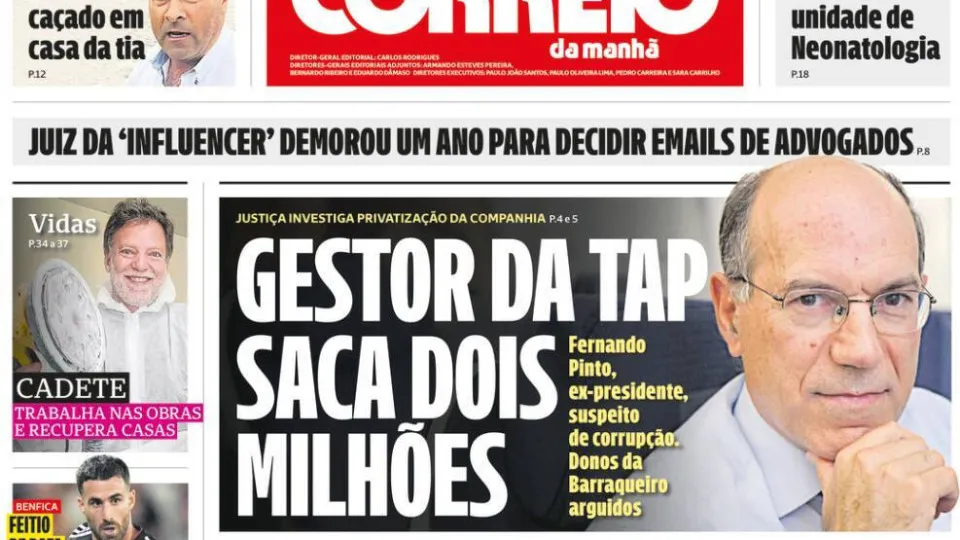
After releasing his new solo album, “Tudo ao Mesmo Tempo,” S. Pedro, formerly a member of the band Doismileoito, shares with Notícias ao Minuto that this new work should actually be called a “compilation,” a kind of “greatest hits.”
He states that if he had gone to the studio with the intention of recording the album, he probably would have completed it in “two weeks.” However, that was not the case. In fact, referring to the songs “Campanhã” and “Sem Ninguém,” the singer mentions that these were “the first ones he recorded,” and the purpose was different.
“They came from a time when I went to Fórum da Maia, and the goal was to make a documentary. It was not at all to make an album,” he reveals, adding that he intended to tell the story behind the process of recording an album (including “ego management, dealing with delays,” or unplanned dinners…). However, when he faced the extensive footage resulting from this experience, he decided not to proceed, at least for now, with the documentary idea.
Nonetheless, the footage became the result of the music videos for both songs, which is why they are “similar.”
“Tudo ao Mesmo Tempo” features collaborations with David Fonseca. “O Futuro” and “Dava a Volta ao Mundo” have the contribution of Carolina de Deus, while “Mal a Música Morreu” is shared with Miguel Araújo. These collaborations were more “easily” realized because the artists are represented by the same agency, Primeira Linha. “But I already liked them, obviously, and admired them a lot. It was just about making the most of a good situation.”
With Miguel Araújo, he shares, “it was a very natural thing.” “I told him I would love for him to come play with me, but if we could avoid singing ‘Anda Comigo Ver os Aviões’ together, that would be great. I told him I had a song, he listened, liked it, and we recorded. It’s very easy to work with Miguel, and I like him a lot.”
Working with David Fonseca was somewhat different but equally swift. A self-professed “fan since childhood” of the singer known for hits like “Someone That Cannot Love,” S. Pedro admits to being thrilled when his manager suggested the collaboration. “I prepared some songs, asked to show three or four to David to see if he liked any.” They ultimately partnered on “O Futuro.” “Receiving the first take of David Fonseca singing one of my songs was quite emotional.”
This album, released as S. Pedro marks 10 years of his career, also includes the tracks “Tão Difícil,” “Tens-me à Mão,” “Tradição,” “Até a Música Acabar,” and “Marta.”
Everything in the world will change, especially in music it is changing, but one thing that always remains is the stories
Among the stories shared in this album, the song “Marta” caught my attention, taking listeners to a school-time love and adolescent experiences. Are the stories always true, or is there a lot of fiction?
There’s always a tendency for people to think that music somehow reflects the truth of the artist, in this case, the singer. But this doesn’t apply the same way when someone makes a film. No one asks [Quentin] Tarantino if it really happened. In music, and even with book writers, it’s almost the same thing.
Is there always this tendency for people to think an artist is inspired by themselves?
And this can sometimes be very limiting for someone writing. The first thing I did when I knew that song was going to be released was to call a friend of mine named Marta and said: Marta, this song is not about you. I took the opportunity to show her the song, and she liked it a lot. It’s because she has a husband, you know? I didn’t want to cause problems [laughs].
Many times I sing about things that happened to me or things someone shared with me so well that I don’t even know if it happened to me or if I imagined or dreamed it. Usually, I sing about things very close to me.
Regarding “Marta,” it wasn’t necessarily about a Marta. This “Marta” personifies something that happens to us at school, mainly at the end of primary school and the start of secondary school, which is when those more emotional adventures occur. It also talks about smoking the first cigarettes… At that time, our perspective is completely different from the world. We all think we’ll be, at least, Formula 1 pilots. Basically, I had to give a name to that feeling, and Marta seemed like a cool thing to sing, it has open vowels… [laughs]
I took my music and asked [artificial intelligence] for a man to sing it in Portuguese [for example]. The two solutions it gave were a thousand times better than mine. I was sad about it, closed it, and went to take a shower. I had to cleanse myself of it all
As an artist, do you enjoy more telling stories with music or conveying feelings?
The combination of these two things happens when you think you’ve made a good song, it’s when you achieve that. And it’s something I’ve valued a lot in recent years, understanding what I’m singing and who the person singing is. And how I interpret this lyric and story, if I am more willing to sing it, if I am more closed off, just as I play the guitar, piano, or whatever. All that interpretation can enhance—when well done—an emotion you truly want to convey. The opposite can also be interesting. Talking about the saddest thing in the world and playing something more cheerful also works.
So, you like combining both, and when that happens, it’s a good result…
Everything in the world will change, especially in music, it is changing, but one thing that always remains is the stories. People get very attached to the story, whether you’re doing trap, hardcore, or whatever. If you have a story, you have a guiding line for people to interpret the whole song.
It doesn’t necessarily have to be about love, but it often involves love because it’s an easily relatable theme. Everyone has experienced some heartbreak, so whenever you talk about certain subjects, you touch on a special place in people. Even writers, when they talk about these subjects, they write with a different emotional charge.
Now you will perform this album on November 19 at Teatro Maria Matos in Lisbon, and then on the 26th at Casa da Música in Porto. Will there be guests? Will the artists you collaborated with on this album be present?
Of course, they will all come, which will be good. In Lisbon, David Fonseca will be there, Carolina de Deus will also attend. Doismileoito, the band I had years ago, will too. We played quite a lot, we were kids, and it was something very special. I feel that some people who like S. Pedro remember Doismileoito. We’re going to do it big and bring those folks together. The problem is they don’t know how to play it properly anymore [laughs].
So there will be Doismileoito songs…
Yes. And João Só will also join me in Lisbon. Teatro Maria Matos is very close to his house, and he self-invited to come. I told him I didn’t have a song for him, and he told me to find one [laughs].
In Porto, Miguel Araújo will come, Doismileoito—they will do both Porto and Lisbon shows—and Joana Almeirante will also sing a song with me. A while ago, I composed a song for her, and she liked it a lot…
And will there be music that won the public over, like “Passarinhos” and “Apanhar de Sol”?
Yes, of course. There will be all those songs with slightly different arrangements. 50% of my band is new, I felt that it was time for a change, so I restructured—from the technical team to the band. I sensed that this next step we have to take is different. Not that the others were bad; they were just the right musicians and technicians to accompany me during a phase where I felt they were the ideal people for the job. Now I’ve looked for another team to enhance what I think these new songs can bring. Those songs have undergone some changes, but I think for the better.
You mentioned earlier that, indeed, the world of music is changing, especially now with artificial intelligence. How have you been reacting to this new challenge?
I can say I did some tests a while back. I took my music, at that time it was “Tradição,” and asked for a man to sing it in Portuguese [for example]. The two solutions the AI presented were a thousand times better than mine. That was my experience. I was sad about it, closed the application, and went to take a shower. I had to cleanse myself from it all [laughs]. I’m afraid to open that application again because it is indeed tempting.
I don’t criticize. Sometimes you have some blockages in writing, or even composing, and artificial intelligence suggests a series of things as if someone working alongside you is suggesting them. Is it legitimate? Is it playing dirty? I don’t delve too deeply. For now, it’s friendly. What it might become? I don’t know. Apparently, it is already becoming present in some playlists and reaching number 1 in some situations… It’s all a matter of supply and demand. If people want it, they have it. Now, is it fair competition? I don’t know…
I find what is happening now very rich. When someone says “it’s all autotune, just backing tracks,” they lose me immediately. Because they are valuing something that no longer makes sense
Even in music promotion, nowadays it’s very different from when you were, for example, with Doismileoito. Has adapting to social media and all digital platforms been easy?
The song with David Fonseca, “O Futuro,” talks precisely about this. I could almost read the lyrics and better answer your question. But that’s how I feel. For many years, I thought I had a mission different from all that ease and that immediate two-second scroll, without having anyone’s attention. I thought there was another realm, this craft-like music area, and over time I realized that no, there really isn’t space for that anymore.
Things change and will not return to what they were. There are only two options: You embrace it and move forward, or you play a different game. You know that’s how this game works and it’s not worth diving into nostalgia, beginning sentences with “in my time it was like this.” It makes no sense.
I’ve been in this for many years, with Doismileoito, existing for about 20 years, so I’ve witnessed it all. During Doismileoito’s time, we had a pretty nice boom, people began to gain courage to sing in Portuguese, Os Pontos Negros, Peixe:Avião, Oioai… Almost pre-Capitão Fausto and all that new wave that emerged. Those were really cool times. And I can say that now, in recent years, it is becoming the most interesting time for me, musically, to hear what people are doing.
I find what is happening now very rich. When someone says “it’s all autotune, just backing tracks,” they lose me immediately. Because they are valuing something that no longer makes sense. What matters is the end result. People should sleep peacefully. If they manage to maintain dignity, it’s all good.
People think the next Beatles will look like the Beatles, and they won’t. They will appear in a completely different way, and people are not paying attention
Sometimes one can get stuck in the past and miss recognition?
People think that the next Beatles will look like the Beatles, and they won’t. They won’t show up with that same hairstyle or suits. They will appear behind a computer, somehow completely differently, and people are not paying attention to that. They’re just focused on a sound or aesthetic that resembles that period. If we focus our attention there, we won’t find the next Beatles, nor the next Nirvana or Neil Young. They won’t appear that way. We’ll only be replicating something that has already occurred.
Comparing Doismileoito times to now as S. Pedro, what has changed the most as an artist?
I have always listened to songs, loved choruses, and always listened to pop. I devoured Michael Jackson—and still do. When I started composing, back when I was with Doismileoito, anytime I felt a chorus was truly a chorus, I tended to destroy it and make an arrangement to camouflage it. In my mind, there was some shame in the chorus being a chorus and easy to sing. I needed to complicate it with a more complex guitar arrangement, and even slightly out-of-tune, to perhaps seem more alternative, as that was the style I liked.
I have lost that shame, that fear. I am embracing songs more openly, accepting choruses. If they talk about love and use the word love, there’s nothing wrong with it; everyone does, and there’s no problem in repeating the chorus one or two more times. It’s great! People come to concerts, so let’s make sure it’s a good experience for everyone. I like it because people sing my songs, and they enjoy it because, for a moment, they even forget some problems they had before coming to the concert. Everyone leaves there winning.
Now you give yourself more freedom?
I am being fairer with myself, staying true to what made me appreciate this. It sounds like I’m saying one is good and the other is bad. [But] I’m talking about me personally; I identify with this too and find it highly challenging to make songs with that level of pragmatism. Is it a chorus? Yes! Let’s embrace the chorus without fear. There’s no problem; let’s not pretend it’s half a chorus; let’s go all in. And there has been radio acceptance; people at concerts are responding well. A “win-win situation.”




